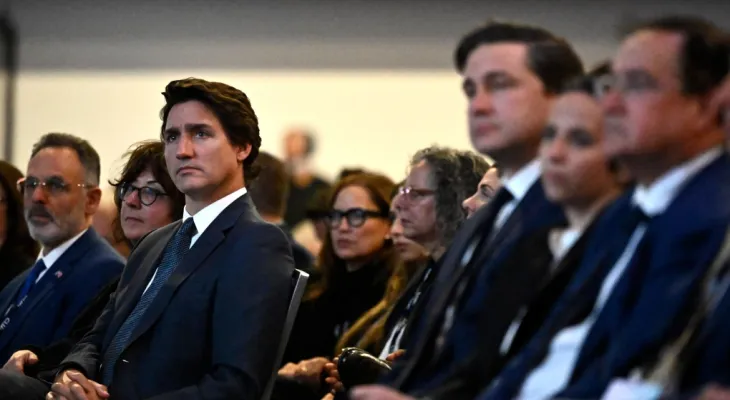Search here
Newspaper
Search here

Arab Canada News
News

Published: March 20, 2024
Conservative leader Pierre Poilievre threatens to move a motion of no confidence against the Prime Minister with the aim of calling a "carbon tax election," if Justin Trudeau does not back down from raising prices on April 1.
During his party rally on Parliament Hill this Wednesday morning, Poilievre spoke about his party's ongoing efforts to pressure the federal Liberal minority regarding their stance on pollution pricing.
Poilievre said: "Today I announce that I am giving Trudeau one last chance to cancel the anticipated increase, one last chance and only one day."
If Trudeau does not announce today the end of his anticipated tax increases on food, gas, and heating, we will present a motion of no confidence against the Prime Minister."
Throughout the week, encouraged by the growing resistance across Canada against raising carbon prices on April 1 by both Conservative and Liberal premiers, Poilievre's party has continued to pressure the Liberals on the carbon price issue, including through a failed attempt to trigger an emergency debate on this issue, without meeting the criteria to prompt such a discussion.
After question period, there will be a vote on Tuesday’s opposition day motion calling on "the Liberal-NDP coalition to immediately cancel this increase," citing "70 percent of provinces and 70 percent of Canadians, who oppose an increase from $65 to $80 per ton of carbon emissions, a 23 percent increase."
And now, with another opposition day discussion and a vote scheduled for Thursday, it appears the Conservatives are prepared to raise the stakes, even if this move is unlikely to succeed.
Poilievre has put forward a notice of motion that reads in part: "That the House of Commons declare no confidence in the Prime Minister and his government ... and calls for the dissolution of the House so Canadians can vote in a carbon tax election."
This is not the first time federal Conservatives have threatened to try to topple Trudeau’s government.
In 2020, just 20 days after the last parliamentary session began, the party looked to table a no confidence motion before backing down.
It is also not the first time the party has called for a "carbon tax election."
In November, amid a week of intense political scrutiny over Prime Minister Justin Trudeau’s decision to lower the carbon price on home heating oil, Poilievre called on Trudeau to temporarily suspend the carbon tax on all home heating devices until Canadians go to the polls.
At that time, the Liberals welcomed the idea of contesting the next election on the basis of the pollution pricing program, with Trudeau saying Canadians are "very concerned about the need to continue fighting climate change."
In the months that followed, the government focused its communications on the rebate element of the carbon tax system, rebranding the climate incentive as the Canadian carbon rebate.
The pollution pricing program and its corresponding rebate system have been in effect since 2019. It imposes a tax on greenhouse gas emissions, making fossil fuel burning more expensive, in an effort to encourage Canadians to change their habits.
Rebates are given to Canadians through direct deposit or checks every three months, in provinces where the federal support system applies.
Amid his recent calls to reverse the latest increase amid ongoing cost of living concerns, Trudeau continues to take the position that the rebate returns money to most Canadians more than they pay in carbon tax, while stating that his job is "not to be popular," but to do "the right things for Canadians a generation from now."
The parliamentary "confidence convention," as it is known, sets an expectation that if the government is defeated on a confidence matter, it is expected to resign or seek dissolution of parliament to hold a general election.
But since March 2021, the Liberals and New Democrats have been operating under a supply and confidence agreement designed to keep Trudeau’s government in power until June 2025, in exchange for advancing New Democratic Party priorities.
The deal between the two parties requires the New Democratic Party to vote with the Liberals, effectively supporting their minority status, on confidence motions such as supply motions or financial votes; motions declared by the government to be confidence matters; and "motions explicitly stating that the House has or does not have confidence in the government."
Comments